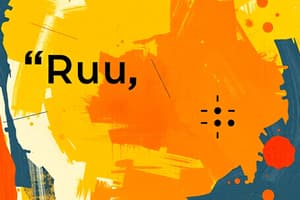Podcast
Questions and Answers
What is a necessary component for citing sources in APA format?
What is a necessary component for citing sources in APA format?
- Works Cited page
- Endnotes
- In-text citations (correct)
- Annotated bibliography
What should be included in a standard APA in-text citation?
What should be included in a standard APA in-text citation?
- Author, year, and title
- Author, year, and page number (correct)
- Author name, title, and page number
- Title, year, and publisher
How should the title on a Works Cited page be formatted in MLA style?
How should the title on a Works Cited page be formatted in MLA style?
- Capitalized and bolded
- Left-aligned and underlined
- Centered with no special formatting (correct)
- Italicized and centered
When must a Works Cited page be included in an MLA style essay?
When must a Works Cited page be included in an MLA style essay?
What is the appropriate spacing between lines in MLA Works Cited entries?
What is the appropriate spacing between lines in MLA Works Cited entries?
Which method of indentation is required for entries in a Works Cited page?
Which method of indentation is required for entries in a Works Cited page?
What is the primary purpose of quoting in academic writing?
What is the primary purpose of quoting in academic writing?
What is the primary difference in citing entries for printed books versus e-books in MLA style?
What is the primary difference in citing entries for printed books versus e-books in MLA style?
Which of the following best describes paraphrasing?
Which of the following best describes paraphrasing?
What type of information is typically included in a reference list entry according to APA format?
What type of information is typically included in a reference list entry according to APA format?
When are citations deemed necessary in academic writing?
When are citations deemed necessary in academic writing?
What defines plagiarism in academic writing?
What defines plagiarism in academic writing?
What citation style uses author-page format for in-text citations?
What citation style uses author-page format for in-text citations?
In APA style, which formatting detail is NOT important for the reference page?
In APA style, which formatting detail is NOT important for the reference page?
How is an in-text citation structured in MLA for a source with three or more authors?
How is an in-text citation structured in MLA for a source with three or more authors?
What additional information is included in APA citations when directly quoting a source?
What additional information is included in APA citations when directly quoting a source?
What would be the appropriate citation in APA style for a work authored by Lopez published in 2011?
What would be the appropriate citation in APA style for a work authored by Lopez published in 2011?
Why are citations important in academic writing?
Why are citations important in academic writing?
Which system uses author-date citations for in-text references?
Which system uses author-date citations for in-text references?
What is the implication of needing to use shortened titles in MLA citations?
What is the implication of needing to use shortened titles in MLA citations?
Study Notes
Quoting, Paraphrasing, and Summarizing
- Quoting involves taking verbatim text from a source, providing credit to the original author.
- Paraphrasing requires rephrasing the original material in the writer's own words while retaining key points.
- Summarizing condenses the main concepts into a brief overview in the writer's own words.
In-text Citations
- In-text citations are parenthetical references within the body of a paper indicating the source of information.
- Typically include the author's name, publication year, and sometimes the page number.
- Required for facts obtained from other sources; not necessary for widely known facts.
- Essential when quoting, paraphrasing, or summarizing another's work.
- Common citation styles: MLA, APA, and Chicago.
- MLA uses author-page style; APA and Chicago use author-date style.
Citation Formats
- MLA In-text Citation:
- 1 author: (Lopez 10)
- 2 authors: (Lopez and Johnson 10)
- 3+ authors: (Lopez et al. 10)
- APA In-text Citation:
- General: (Lopez, 2011)
- Quotation: (Lopez, 2011, p. 10)
- 2 authors: (Lopez & Johnson, 2012)
- 3+ authors: (Lopez et al., 2013)
- Chicago Author-Date:
- General: (Lopez 2011)
- Specific page: (Lopez 2011, 10)
- 2 authors: (Lopez and Johnson 2012)
- 3 authors: (Lopez, Johnson, and Chen 2013)
- 4+ authors: (Lopez et al. 2014)
MLA Style Overview
- MLA format is a standardized writing style primarily for language and literature papers since 1883.
- Increasingly adopted by other disciplines, particularly in higher education.
- Emphasizes organization in presenting papers and citations for clarity and professionalism.
APA Format Overview
- Developed by the American Psychological Association, predominantly used in social sciences and education.
- Requires both in-text citations and a reference list at the end.
- Standard in-text citation follows the format: author, year, and page number.
- The reference page organizes sources alphabetically based on authors' last names, with formatting influenced by source type (article, website, book).
Works Cited Page
- A Works Cited page lists all references used in an MLA-style essay.
- Mandatory when borrowing words or ideas to avoid committing plagiarism.
- Proper citation includes both in-text citations and a Works Cited page.
- Must start on a new page, titled "Works Cited," centered at the top of the page.
- Formatting guidelines require double spacing, reverse indentation for subsequent lines, and alphabetization by the author's last name.
- Different sources have specific citation requirements—e.g., printed books include city of publication, while e-books do not, and online sources require URLs.
Studying That Suits You
Use AI to generate personalized quizzes and flashcards to suit your learning preferences.
Description
This quiz covers essential skills for academic writing, including quoting, paraphrasing, and summarizing. Each of these methods allows a writer to incorporate information from various sources effectively while giving proper credit. Understanding these techniques is crucial for producing clear and credible academic and business writing.




